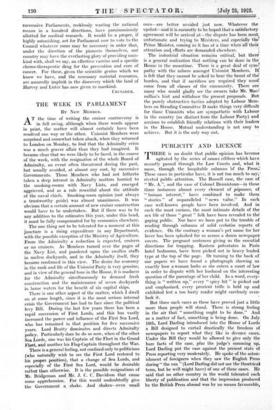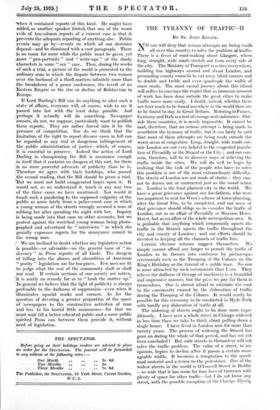PUBLICITY AND LICENCE
THERE is no doubt that public opinion has become agitated by the series of causes celebres which have recently passed through the Law Courts and, what is more, through the hospitable columns of the Press These cases in particular have, it is not too much to say;! riveted public attention. The Russell case, the case of " Mr. A.", and the case of Colonel Dennistoun—in these three instances almost every element of piquance, of " huinan interest," have combined to make them " stories " of unparalleled " news value." In each case well-known people have been involved. And in each the most curious, the most intimate details of the sex life of those " great " folk have been revealed to the gaping public. Nor have we been put to the trouble of reading through columns of solid verbatim reports of evidence. On the contrary a woman's pet name for her lover has been splashed for us across a dozen newspaper covers. The pregnant sentences giving us the essential directions for trapping. Eastern pOtentates in Paris hotel bedrooms, have been picked out in heavy leaded. type at the top of the page. Or turning to the back of our papers we have found a photograph showing us exactly how a woman looks as she enters a court of law in order to dispute with her husband on the interesting question of the parentage of her child. In a word, every- thing is " written up," every " spicy bit " is picked out and emphasized, every prurient trifle is held up and exhibited lest a too hasty reader might carelessly over- look it.
But three such cases as these have proved just a little more than people will stand. There is strong feeling in the air that " something ought to be done." And, as a matter of fact, something is being done. On July, 16th, Lord Darling introduced into the House of Lords a Bill designed to curtail drastically the freedom of newspapers to report what they like in divorce cases. Under the Bill they would be allowed to give only the bare facts of the case, plus the. judge's summing up'. Lord Darling put the case against the present state of Press reporting very moderately. He spoke of the aston- ishment of foreigners when they saw the English Press during " the run " (Lord Darling did not use the theatrical term, but he well might have) of one of these cases. He said that no other country in the world tolerated such liberty of publication and that the impression produced by the British Press abroad was by no means favourable, when it contained reports of this kind. He might have added, as another speaker hinted, that one of the worst evils of ten-column reports of a current case is that it prevents the adequate reporting of anything else.- Public events may go by—events on which all our destinies depend—and be dismissed with a curt paragraph. There Is no room for more while the public must be given yet more " pen-portraits " and " write-ups " of the shady characters in some " sex " case. Thus, during the weeks of such a trial, a picture of the world is presented to the ordinary man in which the dispute between two women Aver the husband of a third matters infinitely more than ,the breakdown of a peace conference, the revolt of an ?Eastern Empire or the rise or decline of Bolshevism in Europe.
If Lord Darling's Bill can do anything to alter such a state of affairs, everyone will, of course, wish to see it passed into law with the least delay possible. And perhaps it actually will do something. Newspaper 'owners, do not, we suppose, particularly want to publish these reports. They are rather forced into it by the pressure of competition. Nor do we think that the limitation of the right to report divorce cases in full can be regarded as any real or dangerous infringement of the public administration of justice—which, of course, it is essential to preserve. Indeed the action of Lord Darling in championing the Bill is assurance enough ;in itself that it contains no dangers of this sort, for there its no more. powerful advocate of publicity than he is. )Therefore we agree with their lordships, who passed ;the second reading, that the Bill should be given a trial. 3ut we must not build exaggerated hopes upon it. It :would not, as we understand it, touch in any way two of the three cases we have mentioned. Nor would it touch such a pandering to the supposed vulgarity of the public as arose lately from a police-court case in which a young woman of the streets wrongly accused a man of robbing her after spending the night with her. Inquiry is being made into that case on other accounts, but we protest against the wretched young woman being photo- graphed and advertised by " interviews " in which she genially expresses regrets for the annoyance caused to the wrong man.
We are inclined to doubt whether any legislative action is possible—or advisable—on the general issue of " in- 'decency " in Press reports of all kinds. The dangers of falling into the abuses and absurdities of American " purity " legislation are far too grave. Few men are fit to judge what the rest of the community shall or shall not read. If certain sections of our society are rotten, it is surely no remedy for us to " hush the matter up." In general we believe that the light of publicity is always preferable to the darkness of suppression—even when it illuminates squalid nooks and corners. As for the 'question of devoting a greater proportion of the space of newspapers to the constructive activities of man and less to his horrid little meannesses—for that we must wait till a better educated public and a more public spirited Press can between them provide it, without need of legislation.



























































 Previous page
Previous page